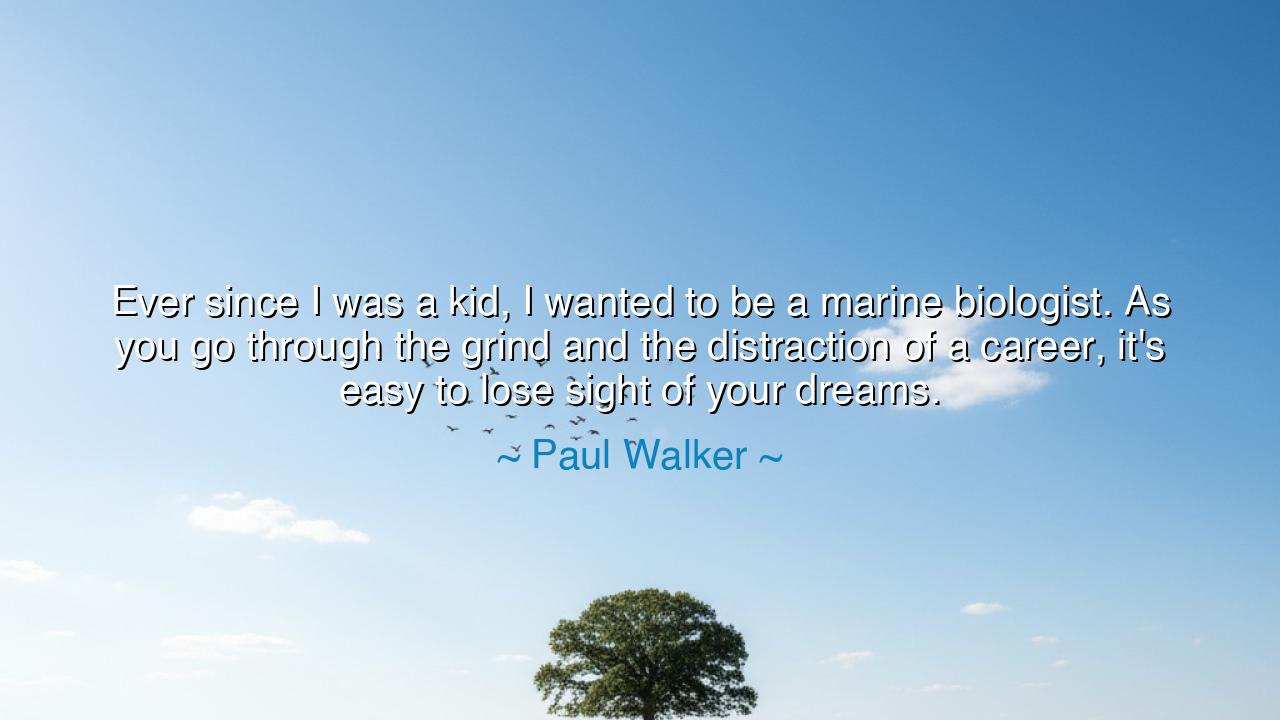
Ever since I was a kid, I wanted to be a marine biologist. As you
Ever since I was a kid, I wanted to be a marine biologist. As you go through the grind and the distraction of a career, it's easy to lose sight of your dreams.






When Paul Walker said, “Ever since I was a kid, I wanted to be a marine biologist. As you go through the grind and the distraction of a career, it’s easy to lose sight of your dreams,” he was not speaking merely of his own life, but of the great tragedy and redemption that dwell within every human soul — the forgetting and remembering of one’s true purpose. His words are tender, almost wistful, yet beneath them lies a truth as deep as the oceans he longed to study: that the world will tempt us away from our dreams, offering in their place the glitter of success, the noise of approval, and the comfort of habit. But the heart never forgets what it once desired in innocence.
Paul Walker, known to the world as an actor and star of The Fast and the Furious films, carried within him a lifelong love of the sea and its mysteries. Before fame found him, his heart belonged to the ocean, to the life hidden beneath its waves. Yet, like many who set out into the world, he was swept into a current stronger than himself — the current of ambition, duty, and worldly distraction. Through his words, he confessed what countless souls feel: that in the grind of daily life, even the most beautiful dreams can fade like distant stars at dawn. Still, he spoke these words not as a lament, but as a reminder — that what we loved as children is often the truest compass of our being.
This idea — that the soul forgets itself amid the noise of life — is as old as humanity. The philosopher Plato once taught that all learning is a kind of remembering, that our deepest truths are not discovered but recalled. The poet Rumi echoed this when he said, “Don’t be satisfied with stories; unfold your own myth.” To lose sight of one’s dream is to lose the thread of that myth — to drift from the inner story that gives meaning to existence. Yet as Walker’s life reminds us, even amidst fame and fortune, the whisper of the original dream remains. It calls, softly but persistently, urging us to return to the path we left behind.
Consider the tale of Charles Darwin, who, though destined by his family to become a clergyman, could never silence his fascination with nature. His love for the living world led him aboard the Beagle, and that voyage changed not only his life, but the destiny of human thought. Like Walker, Darwin was drawn by the call of the sea — not merely its beauty, but the truths hidden in its depths. He, too, could have surrendered his passion to the expectations of others. But he listened to the quiet voice within him — that same voice that Walker describes, the voice that speaks before the distractions of career drown it out.
Walker’s words, then, are not only personal; they are universal. They speak to the human tendency to substitute movement for meaning, achievement for purpose, and success for fulfillment. He warns us gently that the pursuit of status, wealth, or recognition, though intoxicating, can slowly distance us from our truest selves. In the ancient traditions, this was called the “forgetting of the soul” — a blindness that comes not from ignorance, but from overexertion in the wrong direction. The remedy, as Walker suggests, lies in remembrance: in pausing long enough to ask, “What did I once dream of? What did I love before the world told me what to chase?”
Yet his insight also offers hope. To lose sight of one’s dreams is not to lose them forever. The dream waits, patient and unbroken, like the coral beneath the sea — unseen, but alive. Walker himself, later in life, returned to his childhood love for the ocean through his humanitarian work, particularly his organization Reach Out Worldwide, which helped communities rebuild after natural disasters. Through acts of compassion and service, he reconnected to the same spirit that first made him fall in love with the sea — the spirit of awe, curiosity, and care for life. Thus, even if the dream changes its form, its essence endures.
So let this be your teaching: guard your dreams, for they are the truest mirrors of your soul. Do not let the noise of ambition drown the quiet call of wonder. Remember often the things that first set your heart ablaze — the passions that existed before reward, before recognition, before the world’s approval. If you have lost them, go back and listen; they are still there, waiting. For as Paul Walker reminds us, life’s greatest danger is not failure or loss — it is forgetting who we are. And life’s greatest triumph is to remember, and to begin again, walking once more toward the light of the dream that first made us whole.






AAdministratorAdministrator
Welcome, honored guests. Please leave a comment, we will respond soon